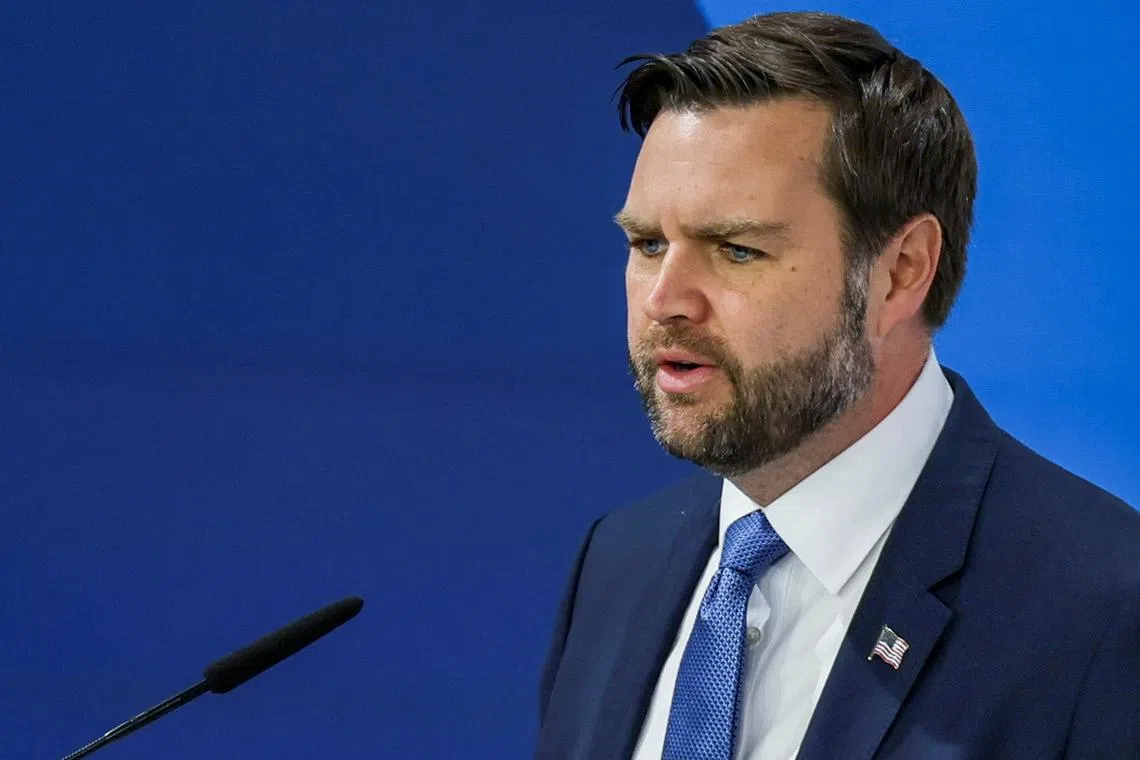Vance tells Zelensky US wants ‘lasting’ peace
Sign up now: Get ST's newsletters delivered to your inbox

US Vice-President J.D. Vance said ahead of the Munich Security Conference that the US was prepared to pressure Russia.
PHOTO: REUTERS
MUNICH – US Vice-President J.D. Vance pledged on Feb 14 that Washington sought to secure a “lasting” peace as he held a first meeting with Ukrainian leader Volodymyr Zelensky to discuss President Donald Trump’s push for a deal
The talks in Munich
“We want to achieve a durable, lasting peace, not the kind of peace that’s going to have Eastern Europe in conflict just a couple of years down the road,” Mr Vance said as the meeting wrapped up.
He said he had “good conversations” with Mr Zelensky about how they could reach that goal, and they would have more talks “in the days, weeks and months to come”.
Mr Zelensky also hailed a “good conversation”, saying the encounter with Mr Vance was “our first meeting, not the last, I’m sure”.
Later, Mr Zelensky on social media platform X wrote: “We are ready to move as quickly as possible towards a real and guaranteed peace.” He added that an envoy from Washington would visit Kyiv.
Mr Trump rattled Ukraine and its European allies on Feb 12 by agreeing to launch peace talks in his first publicly announced call with Mr Putin since returning to office.
The dramatic thaw in relations sparked fears Ukraine could be left out in the cold after nearly three years battling against Moscow’s invasion.
US officials have insisted that Mr Zelensky will be involved in negotiations – and the Ukrainian leader said he would be prepared to sit down with Mr Putin after agreeing a “common plan” with Mr Trump.
“Only in this case I’m ready to meet,” Mr Zelensky told the Munich Security Conference before seeing Mr Vance.
Mr Vance said ahead of the meeting that the US was prepared to pressure Russia, adding that Europe should “of course” be at the table.
But he also told Europe to “step up” on bolstering its own defence to allow Washington to focus on threats elsewhere in the world.
US officials have sent mixed messages over Washington’s strategy, after Pentagon chief Pete Hegseth appeared to rule out Ukraine joining Nato or retaking all of its territory.
That has sparked major worries in Kyiv and Europe that Ukraine could be forced into a bad deal that leaves the continent facing an emboldened Mr Putin.
But Mr Vance told The Wall Street Journal that Mr Trump would put everything “on the table” in potential talks and that Washington could even use “military leverage” against Russia to force a deal.
He did not give more away in a keenly awaited keynote speech, as he avoided addressing the war in Ukraine and focused instead on scolding Europe over immigration and free speech.
Saudi Arabia, after being named by Mr Trump as a likely venue for a meeting with Mr Putin, said it would welcome holding any talks between the two leaders.
Mr Zelensky appeared to play down fears that Mr Trump was cutting out Kyiv, saying the US President had given him his personal number when they spoke.
French President Emmanuel Macron said he assured Mr Zelensky that it is “Ukrainians alone who can drive the discussions for a solid and lasting peace” with Russia, in a post on X.
In a bid to keep Washington close, Kyiv has held talks over granting access to its rare mineral deposits in return for future US security support.
European allies, who along with Washington are Ukraine’s strongest backers, demanded they too be included in negotiations that will impact their continent’s security.
European Commission president Ursula von der Leyen warned that forcing Ukraine into a bad deal would harm US interests.
“I believe that by working together, we can deliver that just and lasting peace,” she said.
While Europe nervously monitors the US stance on Ukraine, there is little ambiguity on Mr Trump’s determination to get Europe to spend more on its defence.
Fears that Mr Vance could announce a major US troop reduction in Europe did not materialise, but he repeated warnings that Washington needed to focus more on other parts of the globe.
On the sidelines of the conference, Mr Vance also met Ms Alice Weidel, leader of the far-right Alternative for Germany (AfD), according to German press.
It comes as Mr Vance criticised Germany for blocking the far right from possibly sharing power in upcoming elections.
Mr Friedrich Merz, the conservative candidate and poll favourite, insists he would not govern with the AfD or actively seek its support.
Amid the diplomatic flurry in Munich, Mr Zelensky said that back on the ground in Ukraine, a Russian drone had struck a cover built to contain radiation at the Chernobyl nuclear power plant, though he added that radiation levels were normal.
The Ukrainian Air Force said Russia launched 133 drones across the country overnight, including attack drones, targeting northern regions of the country where the Chernobyl plant lies.
Mr Zelensky said the attack was evidence that “Putin is definitely not preparing for negotiations – he is preparing to continue deceiving the world”. AFP


